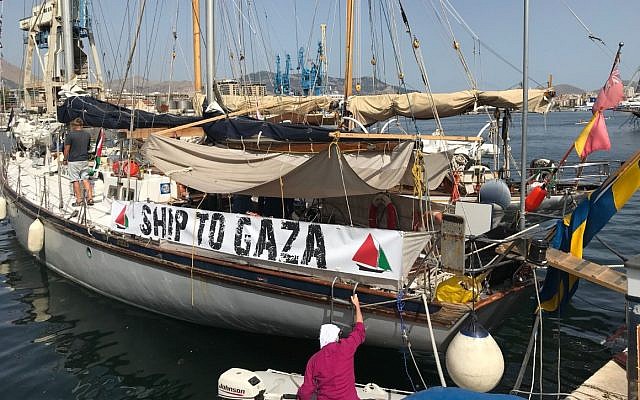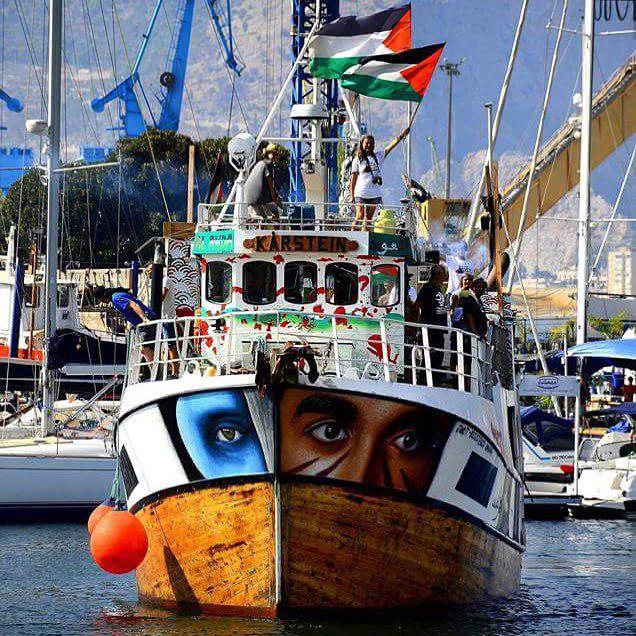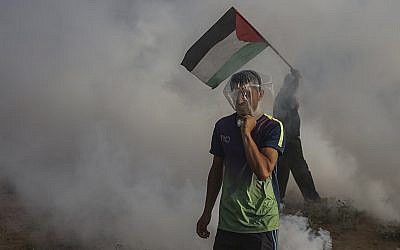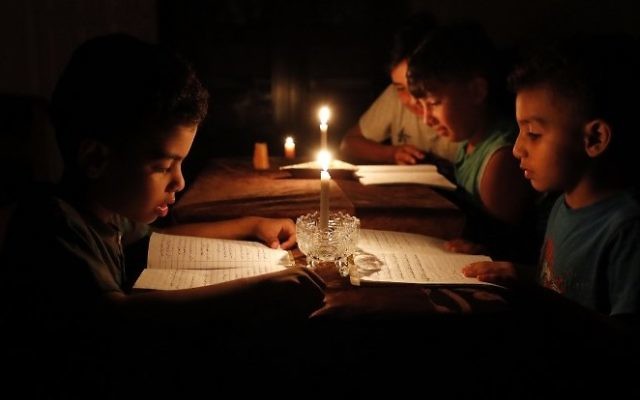 Boat trying to break Gaza blockade seized by Israeli navy
Boat trying to break Gaza blockade seized by Israeli navy
TOI STAFF
Organizers says vessel ‘hijacked’ and towed to Ashdod; IDF confirms it intercepted the boat, says it was in violation of blockade
 The ‘Freedom,’ one of the boats headed to the Gaza Strip in a flotilla defying Israel’s blockade, July 2018 (screen capture: Press TV/Twitter)
The ‘Freedom,’ one of the boats headed to the Gaza Strip in a flotilla defying Israel’s blockade, July 2018 (screen capture: Press TV/Twitter)
The Israeli Navy on Sunday stopped a boat that was trying to break the maritime blockade of the Gaza Strip and started to tow the vessel to the port in Ashdod.
The “Freedom Flotilla” group said that the boat had been “seized” and that the ship had received a warning from the navy prior to the interception.
According to the group, the navy said it would “take all necessary measures” if the vessel did not adjust its course.
The IDF confirmed that it had intercepted the boat and was towing it to the nearby Ashdod port.
“The forces made it clear to the boat that it was violating the blockade and that any humanitarian supplies [it is carrying] can be delivered to Gaza through the port of Ashdod,” the military said in a statement. “The activity ended without any unusual incidents. The boat is being towed to the port of Ashdod at this time.”

#FreedomFlotilla boat carrying medical supplies for #Gaza hijacked by Israeli forces. Please contact your governments & demand #FreePassage #FreedomOfMovement for #AlAwda with her cargo of solidarity & hope for a Just Future for #Palestinehttps://jfp.freedomflotilla.org/news/freedomflotilla-boat-carrying-medical-supplies-for-gaza-hijacked-by-israeli-forces … #CountdowntoGaza
The “Return” (al-Awda) is one of two vessels making up the flotilla, alongside “Freedom.”
The flotilla was organized by the Freedom Flotilla Coalition, an umbrella of organizations aiming to end the closure of Gaza, and set sail from the Danish port of Copenhagen.
Those on board the ships include Prof. Ismail Nazari, chairman of Malaysia’s boycott Israel campaign; Charlie Andreason of Sweden, who spent time in Israeli detention for his role on the Marianne, a Swedish-flagged trawler leading a flotilla of boats in June 2015; Spanish Jewish activist Zohar Shamir Chamberlain; and Heather Milton-Lightening, an activist for indigenous Canadians.
The flotilla’s two-month journey saw the ships stopping off at several European ports to take part in activities supporting the Palestinians’ so-called “March of Return.”
It is under the “March of Return” banner that more than 100 Palestinians and one Israeli have been killed in violent clashes with Israeli security forces along the border fence since March 30.
Most of the Palestinians killed were members of the Hamas terror group, according to the group itself.
 Teargas canisters fired by Israeli troops fall over Palestinians during a protest at the Gaza Strip’s border with Israel, Friday, July 13, 2018 (Wissam Nassar/Flash90)
Teargas canisters fired by Israeli troops fall over Palestinians during a protest at the Gaza Strip’s border with Israel, Friday, July 13, 2018 (Wissam Nassar/Flash90)
Hamas has promised Gazans that they will “return” to homes in what is now Israeli territory. The Palestinians claim that tens of thousands of original refugees, displaced at the time of Israel’s creation in 1948, and their millions of descendants, have a “right of return.”
Israel will not agree to such a “return,” which would see a Palestinian majority outnumbering Jews and effectively bringing an end to the Jewish state.
Israel has imposed a blockade on Gaza since Hamas, which is sworn to Israel’s destruction, seized the territory from the internationally backed Palestinian Authority in 2007. It says the blockade is in place in order to prevent weapons and other military equipment from entering the Strip.
Critics point to worsening humanitarian conditions in Gaza and say the blockade amounts to collective punishment of the two million Palestinians living there. There have been many reports that the coastal strip is “on the verge of collapsing,” and could plunge into a new round of fighting with Israel if conditions do not improve.
 A picture taken on June 13, 2017, shows Palestinian children at home reading books by candle light due to electricity shortages in Gaza City. (AFP/ THOMAS COEX)
A picture taken on June 13, 2017, shows Palestinian children at home reading books by candle light due to electricity shortages in Gaza City. (AFP/ THOMAS COEX)
Egypt, too, has kept its Gaza border crossing largely closed during several years of sour relations with the Islamist group ruling Gaza.
Many attempts have been made to draw attention to the Palestinian cause using blockade-busting flotillas.
Two years ago, 13 women, including Nobel Peace Prize winner Mairead Maguire of Northern Ireland, were detained and then deported after their sailboat, “Women’s Boat to Gaza,” was stopped around 35 nautical miles off the coast of Gaza on its way to break the blockade.
The Israel Navy said at the time that it had stopped the boat to prevent a “breach of the lawful maritime blockade” of the Palestinian enclave and after advising it “numerous times to change course prior to the action.”
The most notorious flotilla sailed in 2010 and involved the Turkish flag-bearing Mavi Marmara, the biggest ship in a six-vessel convoy. IDF commandos who boarded the ship were violently attacked by those on board. Nine Turkish citizens, including one with American citizenship, were killed in the ensuing melee, and a tenth died of his wounds years later. A number of Israeli soldiers were injured in the raid.
Zawartość publikowanych artykułów i materiałów nie reprezentuje poglądów ani opinii Reunion’68,
ani też webmastera Blogu Reunion’68, chyba ze jest to wyraźnie zaznaczone.
Twoje uwagi, linki, własne artykuły lub wiadomości prześlij na adres:
webmaster@reunion68.com
